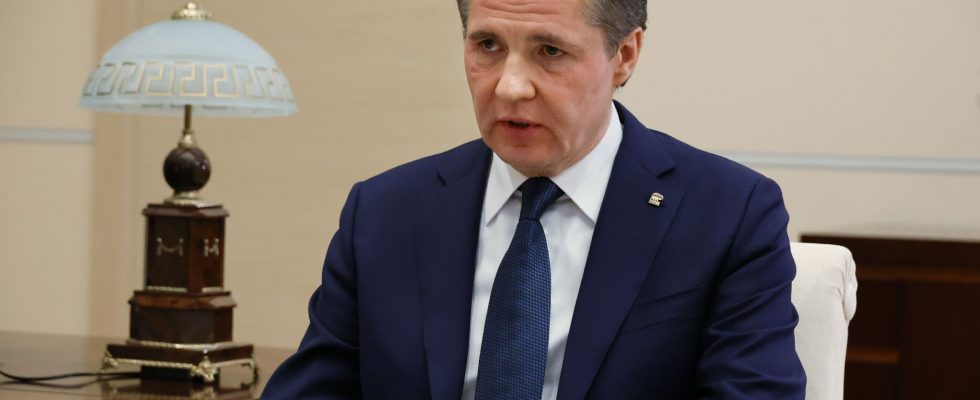Who knows Vyacheslav Gladkov? Before the war, few people outside the small circle of Kremlinologists would have been able to answer that it was the governor of the Russian region of Belgorod. A technocrat with a smooth biography, any physique: the ideal prototype of the governor in the Putin system. But the Belgorod region borders Ukraine. And for several months, it has been turning, little by little, into a war zone. Between March and June, anti-Putin fighters allied with the Ukrainian army launched increasingly large raids there, occupied villages, laid siege to towns, provoked bombardments and evacuations.
It was during this period that Vyacheslav Gladkov made a name for himself. Very reactive, he takes up the style of communication invented by Volodymyr Zelensky: short videos shot at arm’s length on his personal smartphone in which, at the wheel of his car or at his workstation, he appears in shirt sleeves to give its administered the latest news of the fights and answer their questions. His private Telegram channel has nearly 400,000 subscribers. On August 2, Vyacheslav Gladkov even announced that he had distributed arms to the “Territorial Defense” of his region, battalions of volunteers dedicated to the defense of Belgorod. The next day, his colleague from the neighboring Kursk region, Roman Starovoit, did the same.
“Wagner bis”
Tomorrow, perhaps they will go even further. On July 26, the Russian Parliament adopted a law giving the regions the authority to raise troops. Which, de facto, amounts to creating new private military companies, which will be added to those already created by the big Russian companies. The decision came as a surprise, when observers had rather expected, after the Wagner revolt, a dissolution of private military companies. But “the Russian central power is pursuing a logic in place since the start of the war: to make the regions bear the burden and responsibility for the war”, analyzes researcher Anna Colin-Lebedev.
A revolution, compared to the role usually assigned to governors: to expedite current affairs without making waves, to ensure that Vladimir Putin’s popularity rating is at its highest in their region, and on occasion, to be reprimanded in front of the cameras by the Russian president. In short, to be simple links in the “vertical of power”.
The term almost single-handedly defines the political philosophy of the Russian president. It designates a system at the antipodes of the federalism displayed by the Russian state, in which all authority and all legitimacy derive solely from Vladimir Putin himself. In this system, there are no politicians, only performers. The vertical of power has functioned for more than twenty years and ensured Putin an exceptional longevity in the Kremlin. The war in Ukraine is making it obsolete. “While the Kremlin has done everything since 2000 to centralize the country and remove any margin of autonomy from the regions, the war makes the regions real political actors,” adds Anna Colin-Lebedev.
power struggle
The first flaws in this vertical had even appeared before February 24, 2022. At the time of Covid, Vladimir Putin had made governors responsible for health measures and the vaccination campaign. Already, this had contributed to giving a certain political substance to the mayor of Moscow, Sergei Sobyanin.
It is the same logic that has prevailed since the beginning of the war. The conduct of mobilization, the construction of defenses in the border regions and even the management of Ukrainian incursions and bombardments are subcontracted to the governors. With a consequence: they make a name for themselves and political capital. Soon they will be able to maintain their own militias. “The famous Poutinian vertical has vanished like a mirage,” notes political scientist Tatiana Stanovaya in an analysis published by the Carnegie Center. “Instead of a single iron fist in the foreground, we find a multitude of mini-Prigojine, less crazy but not necessarily less dangerous, due, in particular, to their position in power. They all realize that the era of post-Putin Russia is coming, it’s time to arm up and prepare for the great power struggle in Russia.”
The “vertical of power” has lived
What form will this struggle for power take? It could turn into a real civil war between regional barons with their own armies. Or else a muffled confrontation during a more or less controlled transition, in which armed force would be only one of the components of the competition… All the options are on the table. But the mere fact that the question can be posed in these terms is in itself a revolution in Russia: if the question of Vladimir Putin’s succession has been on our minds for fifteen years, one thing was obvious: this would be the master of the Kremlin who would appoint his successor, at the time and in the way he would have chosen. Today, the suitors accumulate their political capital, their network and even their armies. Sign that the “vertical of power” has lived.
